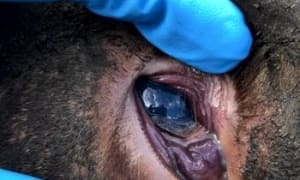AFTER the smoke has settled and the fires are extinguished, roads are reopened and communities begin to rebuild.
Left to assess the scorched land and the smouldering ruins, the blackened trees and the decimated livestock, immediate help is available, but what long term assistance and support needs to be provided to farming communities that have been fire affected.
Lachlan Barnes from Dairy Australia said in the aftermath of the fire the priority was to get surviving stock fed and injured animals looked at, and attempt to get back to a normal level of production.
“Initially diesel was the call, generators, fodder, places to milk the cows,” Lachlan said.
“The pressure was on the right now and all efforts focused on the immediate.
Latest Stories
“We would make contact with people who had registered a critical need, and would find that they had managed to source the things they needed.
“It was heartening to see communities rally and the assistance that was available.
“The fire ground was still active, which was a bit unusual, because normally fire will come through and you can usually get access immediately afterwards.
“With it as an ongoing situation, control centres had to be very considered when providing on-the-ground support so that it didn’t prove counter-productive, and they weren’t causing undue safety issues or sending flammable things like diesel into a fire zone for example.
“It was an exercise in weighing up the consequences of denying all access, and the need to get things in and make them happen, so procedures were put in place and assistance was then forthcoming.
“With the dairy industry in particular, the more milking that is missed the more damage that is caused.
“Not only is it causing distress to animals in an already stressful situation, but it results in mastitis and can also affect milk quality - just this whole compounding effect.
“Once people knew what they needed to do to get onto the active fire ground, they were there registering at 7am ready to go.
“The processors have been amazing throughout the whole disaster as well, getting in touch with their suppliers as much as they could.
“They were one of the first ones to say if we can get a milker in we will, responding with immediate help to those affected.”
With immediate needs being met, Dairy Australia is primarily collecting information and collating data regarding those who need help.
For though all the donations are incredible there is always the concern that sometimes the money does not go to the right places.
“We’re getting information directly from the farmers and working out what are the real needs when full access is restored, and what others can offer now and into the future,” Lachlan said.
“There is the amazing response with donated fodder for farmers whose pastures and stored feed have been lost, but Dairy Australia is looking beyond the short-term.
“We want out farmers to get back to home-grown production as soon as possible with infrastructure rebuilt as a matter of urgency.
“There is the importance of adequate fencing and getting it back up and running, so farmers are able to utilise all their land once it’s up and in full production.
“With a good autumn break we can see the possibility of paddock recovery, if farmers can get in there and sow.
“They’ve lost perennial pastures and even feed wedges, but it’s not just physically getting grass to grow, it’s all the work that goes with it, all the machinery, and infrastructure and power requirements.
“So the plan for the future is primarily a case-by-case basis, where all the needs are assessed to ensure producers can get back to business as usual.
“In regards to getting businesses back on their feet, we just need profitable farms.
“If we can get back to a position where farmers receive a decent margin on their milk then they’ll stay in business, and if they don’t then they won’t be able to survive.”
This sentiment is echoed by Kylie Holmes, the executive officer at the Rural Financial Counselling Service in Gippsland, who acknowledges it’s not just dairy farmers who are doing it hard it’s across the board for those in agriculture at the moment.
The cost of feed and water has all primary producers doing it tough, with even those producers who were viable before the drought having to draw down on all their cash reserves to get them through.
And for those who have been fire-affected it has served to exacerbate the impact the drought has already had on their livelihoods.
“It’s the farmers who have destocked to get through the drought, just holding onto their breeders and this is the stock that they have lost,” Kylie said.
“They’ve spent so much effort and money keeping these animals alive and now they’re gone, and many of these farmers are at a tipping point.
“So even though on the ground, we have Ag Vic, the VFF, Dairy Australia all there and willing to provide technical support and assist with future planning, the question is ‘Do the farmers have the capacity and the willpower to continue on anymore?’
“Because this is the biggest thing having gone through the drought, to then have to contend with this disaster, people are absolutely devastated.
“It’s the last thing they want to deal with, and quite honestly some are broken, and the last thing they need to be doing is making decisions right now.
“So my main concern for initial and ongoing support and assistance is somebody for farmers to discuss things with and to get advice.
“At the moment the concentration is on cleaning-up, and farmers aren’t ready to make plans.”
However, Kylie does believe that it is paramount for farmers to contact their bank as one of the initial steps as there are immediate packages and assistance available.
“The next steps are small; farmers need to go to trusted sources and begin to formulate a plan, and then if they have the energy, the drive and the capacity to rebuild then that’s what they should do,” Kylie said.
“Everything at the moment is in a very sharp bleak reality, and though there is an influx of funding and resources about to hit the ground, this is the time for many to make their mental health and wellbeing the priority, and all decisions to flow from there.”
With this as a necessity, mental health and available counsellors and appropriate boots on the ground are fundamental to supporting the agricultural community after the trauma of recent events.
And Kylie believes that in every state recovery packages need to be consistent and considered, and with a long term objective.
Kylie is also heavily involved with the Gippsland Emergency Relief Fund (GERF), a registered charity that assists Gippslanders who have been affected by natural disasters.
Set up in 1978, the fund is run by volunteers and subsidised by donations, and provides immediate short-term funding for those in need.
“There are lots of offers of assistance at the moment which is particularly heart-warming,” Kylie said.
“There are huge amounts of organisations chipping into bushfire relief, and then on a personal level, driving up to South Gippsland on the freeways there are so many tradie vehicles – from Frankston, from Dandenong, from Sunshine, from everywhere – heading up the region to assist.
“I’m driving along giving them all the thumbs up.”
With tradies on the ground, and the state government offering to demolish any damaged infrastructure and buildings free of charge, the preliminary steps to recovery are beginning.

BlazeAid has camps set up around the country to assist with re-fencing, accessibility is opening up to allow feed and tankers in the fire zones, and agistment is secured for surviving animals in the region.
But as Glen Barrett from Jersey Australia reiterated “you can’t have that level of damage and things get back to normal overnight, it’s going to take a significant amount of time to rebuild”.
“And within that we also all need to realise, that bigger than the fires and the drought, we need to ensure that the dairy industry, the agricultural industry overall, is viable,” Glen said.
“That the price is applicable to the product that farmers are producing.”
And in a process of recovery, continued support is essential, and farmers need to be recognised at the farmgate level and paid appropriately to ensure longevity and survivability.













